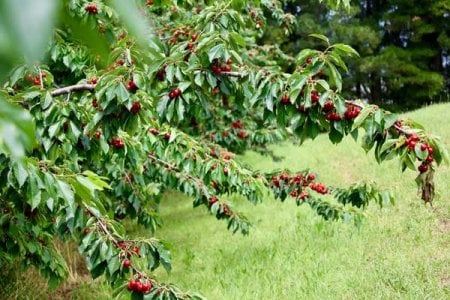Farmers expose unfair practices of supermarkets amid ‘price gouging’ investigation
The ongoing parliamentary inquiry into the alleged practice of 'price gouging' by supermarkets has undoubtedly garnered significant interest from consumers.
As the investigation unfolds, the magnitude of its impact on local farmers in Orange, New South Wales (NSW), is becoming increasingly evident.
These farmers are contending with numerous challenges that have the potential to affect the cost of groceries.
Former cherry farmer Michael Cunial's story is just one example of the challenges faced by farmers in the current retail climate.
He said that he left the industry after major supermarkets caused him a loss of nearly $85,000.

He recounted how he was short-changed on multiple deliveries of his produce to Coles and Woolworths. In one instance, he received a mere $5,800 on the seconds market for 15 tonnes of cherries he had expected to sell for $90,000.
More and more farmers are realising the unfair pricing practices of major supermarkets and may follow his lead in leaving the industry, he claimed.
His experience is not an isolated incident, as fellow Orange-based farmer Guy Gaeta attested.
He said: ‘I’ve been working in Orange for 38 years, and over the past 30 years I’ve seen about 200 farmers walk away with nothing, after working and selling their crops every day.’
‘People don’t understand how ruthless the supermarkets are,’ he added. ‘Just to sell a zucchini it has to be perfectly straight—pretty soon they will expect bananas to be straight, believe me.’
Gaeta was scheduled to speak at the next public hearing for the Senate Committee investigating price gouging in the rural NSW town on March 12.
The senate committee investigating these issues has heard from various stakeholders, including farmers who have called for drastic measures such as a forced split of Coles and Woolworths.
The supermarkets, who hold 65 per cent of the market share, have denied allegations of profiteering and price gouging, attributing their profits to in-store productivity improvements.
The probe is examining these supermarket chains' price-setting and competition practices, after allegations surfaced that they are taking advantage of both consumers and suppliers.
The implications of such practices are far-reaching, potentially affecting the price and quality of goods available to shoppers, including many seniors who rely on affordable groceries to manage their fixed incomes.
Nationals Senator Ross Cadell, a member of the Senate Committee, has emphasised the importance of the inquiry.
‘The inquiry in Orange that I am part of today is important because prices impacting farmers ultimately end up impacting prices at the checkout,’ he said.
Local farmers in Tasmania demanded that Coles and Woolworths should not be ruled out for a forced split during a round of hearings last week.
Jeremy Griffith from the National Farmers Federation stated: ‘The moment you take it off the table, you are essentially giving a licence to print money to the existing duopoly.’
The debate has reached the highest levels of government, with Prime Minister Anthony Albanese ruling out the proposal to break up the supermarket giants.
He said in an interview: ‘We have a private sector economy in Australia and not a command and control economy. We’re not the old Soviet Union.’
This stance has been met with disappointment from some, including Senator Cadell, who believes that all options should be on the table to ensure a fair and competitive market.
As the inquiry continues, it's crucial for consumers, particularly seniors who may be more vulnerable to price fluctuations, to stay informed about the outcomes and implications.
In the meantime, it's wise to be vigilant about your shopping habits. Compare prices, look for discounts, and consider supporting local farmers' markets where possible. By doing so, you not only get potentially fresher produce but also contribute to a more sustainable and equitable food system.
 What do you think of this story, members? Share your thoughts in the comments below.
What do you think of this story, members? Share your thoughts in the comments below.
As the investigation unfolds, the magnitude of its impact on local farmers in Orange, New South Wales (NSW), is becoming increasingly evident.
These farmers are contending with numerous challenges that have the potential to affect the cost of groceries.
Former cherry farmer Michael Cunial's story is just one example of the challenges faced by farmers in the current retail climate.
He said that he left the industry after major supermarkets caused him a loss of nearly $85,000.

An ex-cherry farmer has recently come forward and revealed that he was short-changed by almost $85,000 by supermarkets. Image source: Unsplash
He recounted how he was short-changed on multiple deliveries of his produce to Coles and Woolworths. In one instance, he received a mere $5,800 on the seconds market for 15 tonnes of cherries he had expected to sell for $90,000.
More and more farmers are realising the unfair pricing practices of major supermarkets and may follow his lead in leaving the industry, he claimed.
His experience is not an isolated incident, as fellow Orange-based farmer Guy Gaeta attested.
He said: ‘I’ve been working in Orange for 38 years, and over the past 30 years I’ve seen about 200 farmers walk away with nothing, after working and selling their crops every day.’
‘People don’t understand how ruthless the supermarkets are,’ he added. ‘Just to sell a zucchini it has to be perfectly straight—pretty soon they will expect bananas to be straight, believe me.’
Gaeta was scheduled to speak at the next public hearing for the Senate Committee investigating price gouging in the rural NSW town on March 12.
The senate committee investigating these issues has heard from various stakeholders, including farmers who have called for drastic measures such as a forced split of Coles and Woolworths.
The supermarkets, who hold 65 per cent of the market share, have denied allegations of profiteering and price gouging, attributing their profits to in-store productivity improvements.
The probe is examining these supermarket chains' price-setting and competition practices, after allegations surfaced that they are taking advantage of both consumers and suppliers.
The implications of such practices are far-reaching, potentially affecting the price and quality of goods available to shoppers, including many seniors who rely on affordable groceries to manage their fixed incomes.
Nationals Senator Ross Cadell, a member of the Senate Committee, has emphasised the importance of the inquiry.
‘The inquiry in Orange that I am part of today is important because prices impacting farmers ultimately end up impacting prices at the checkout,’ he said.
Local farmers in Tasmania demanded that Coles and Woolworths should not be ruled out for a forced split during a round of hearings last week.
Jeremy Griffith from the National Farmers Federation stated: ‘The moment you take it off the table, you are essentially giving a licence to print money to the existing duopoly.’
The debate has reached the highest levels of government, with Prime Minister Anthony Albanese ruling out the proposal to break up the supermarket giants.
He said in an interview: ‘We have a private sector economy in Australia and not a command and control economy. We’re not the old Soviet Union.’
This stance has been met with disappointment from some, including Senator Cadell, who believes that all options should be on the table to ensure a fair and competitive market.
As the inquiry continues, it's crucial for consumers, particularly seniors who may be more vulnerable to price fluctuations, to stay informed about the outcomes and implications.
In the meantime, it's wise to be vigilant about your shopping habits. Compare prices, look for discounts, and consider supporting local farmers' markets where possible. By doing so, you not only get potentially fresher produce but also contribute to a more sustainable and equitable food system.
Key Takeaways
- A former cherry farmer from Orange claimed major supermarkets, such as Coles and Woolworths, short-changed him nearly $85,000.
- The farmer, who left the industry due to financial losses, suggested more farmers are becoming aware of these practices and may also leave the sector.
- A Senate Committee investigating allegations of price gouging by supermarket chains is holding public hearings, with local farmers advocating for market fairness.
- Despite calls from some farmers for the potential forced split of the Coles and Woolworths duopoly, Prime Minister Anthony Albanese dismissed such a suggestion, emphasising Australia’s private sector economy.







